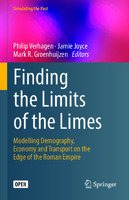Finding the Limits of the Limes
Modelling Demography, Economy and Transport on the Edge of the Roman Empire
Contributor(s)
Verhagen, Philip (editor)
Joyce, Jamie (editor)
Groenhuijzen, Mark R. (editor)
Collection
Dutch Research Council (NWO)Language
EnglishAbstract
This open access book demonstrates the application of simulation modelling and network analysis techniques in the field of Roman studies. It summarizes and discusses the results of a 5-year research project carried out by the editors that aimed to apply spatial dynamical modelling to reconstruct and understand the socio-economic development of the Dutch part of the Roman frontier (limes) zone, in particular the agrarian economy and the related development of settlement patterns and transport networks in the area. The project papers are accompanied by invited chapters presenting case studies and reflections from other parts of the Roman Empire focusing on the themes of subsistence economy, demography, transport and mobility, and socio-economic networks in the Roman period. The book shows the added value of state-of-the-art computer modelling techniques and bridges computational and conventional approaches. Topics that will be of particular interest to archaeologists are the question of (forced) surplus production, the demographic and economic effects of the Roman occupation on the local population, and the structuring of transport networks and settlement patterns. For modellers, issues of sensitivity analysis and validation of modelling results are specifically addressed. This book will appeal to students and researchers working in the computational humanities and social sciences, in particular, archaeology and ancient history.
Keywords
Social sciences; Social sciences—Data processing; Social sciences—Computer programs; Archaeology; Computer simulation; Europe—History—To 476; Application softwareDOI
10.1007/978-3-030-04576-0Publisher
Springer NaturePublisher website
https://www.springernature.com/gp/products/booksPublication date and place
Cham, 2019Series
Computational Social Sciences; Simulating the Past,Classification
European history
Archaeology
Society and Social Sciences
Computer modelling and simulation


 Download
Download Web Shop
Web Shop